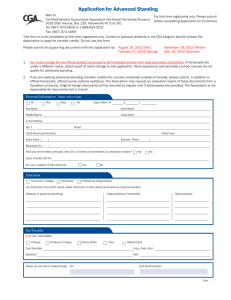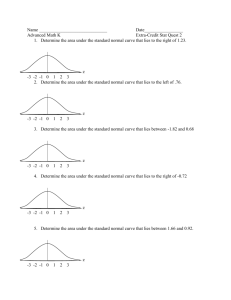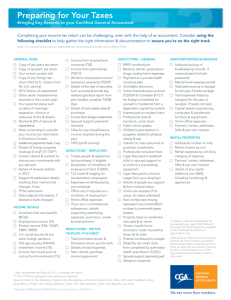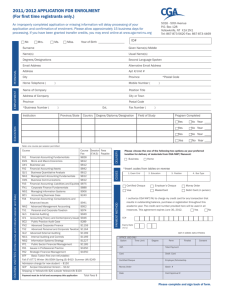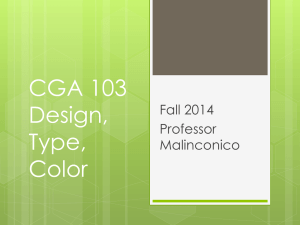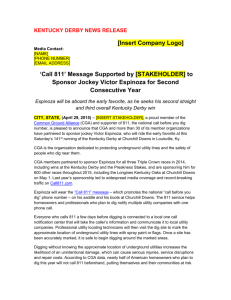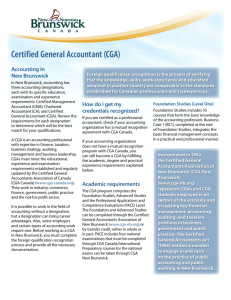Fact Sheet for Accountants
advertisement
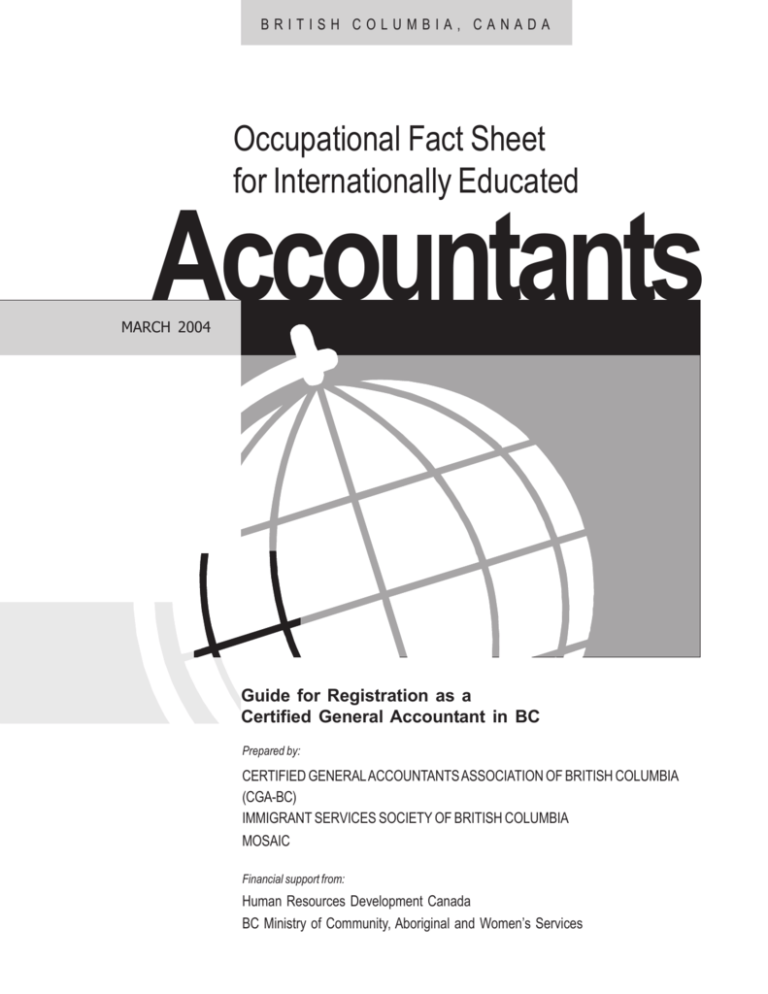
BRITISH COLUMBIA, CANADA Occupational Fact Sheet for Internationally Educated Accountants MARCH 2004 Guide for Registration as a Certified General Accountant in BC Prepared by: CERTIFIED GENERAL ACCOUNTANTS ASSOCIATION OF BRITISH COLUMBIA (CGA-BC) IMMIGRANT SERVICES SOCIETY OF BRITISH COLUMBIA MOSAIC Financial support from: Human Resources Development Canada BC Ministry of Community, Aboriginal and Women’s Services Disclaimer This Occupational Fact Sheet was developed by the Certified General Accountants of British Columbia (CGA-BC) and the partnership of Immigrant Services Society of British Columbia (ISS) and MOSAIC. Information in this Fact Sheet will be updated on a regular basis. Requirements may change without notice. If you require clarification, contact the CGA-BC. Copyright Copyright of this Occupational Fact Sheet is held jointly by CGA-BC and the partnership of ISS and MOSAIC, 2003. This Fact Sheet may be used or reproduced by any third party for non-commercial, not-for-profit purposes, provided that no fee, payment or royalty of any kind shall be charged by the third party for any further use or reproduction of the Fact Sheet by any person. Any proposed commercial or for-profit use or reproduction of this Fact Sheet requires a written license from both the CGA-BC and the partnership of ISS and MOSAIC. Websites This document can be accessed on the Internet through: • CGA-BC’s website: www.cga-online.org/bc (or before May 2004 www.cga-bc.org) • Human Resources and Skills Development Canada’s website: www.bc.hrdc-drhc.gc.ca • BC Ministry of Community, Aboriginal and Women’s Services’ web site: www.gov.bc.ca/mcaws And the websites of: Immigrant Services Society of British Columbia #501 - 333 Terminal Avenue Vancouver, BC V6A 2L7 Phone: 604-684-2561 Fax: 604-684-2266 Email: immserv@issbc.org Website: www.issbc.org MOSAIC 1522 Commercial Drive Vancouver, BC V5L 3Y2 Phone: 604-254-0244 Fax: 604-254-3932 Email: employmentprograms@mosaicbc.com Website: www.mosaicbc.com BRITISH COLUMBIA, CANADA Occupational Fact Sheet for Internationally Educated Accountants Table of Contents 1 Purpose of the Fact Sheet / 3 2 What are My Job Prospects as an Accountant in BC? / 3 3 Who Certifies Accountants in BC? / 4 4 What are the Requirements for Certification as a Certified General Accountant? / 5 5 How Long Does it Take and How Much Does it Cost? / 6 6 How Do I Become a Certified General Accountant (CGA) in BC? / 7 Checklist / 7 7 How Does the CGA Certification Process Work? / 9 Step by Step Process / 9 Step 1: Request an Application / 9 Step 2: Submit an Application and Assessment Form / 9 Step 3: Assessment of Academic Qualifications / 11 Step 4: Enrol in Courses to Meet Outstanding Requirements / 11 Step 5: Meet Other Requirements / 15 Step 6: Degree Requirement / 15 Step 7: Work Experience Assessment / 16 Step 8: Certification as a CGA / 17 8 Reasons for Delay and How to Speed the Process / 18 9 Fees / 19 10 Contact Information / 20 11 Glossary / 22 Occupational Fact Sheet for Internationally Educated Accountants 1 3 Purpose of the Fact Sheet This fact sheet is for internationally educated accountants, that is, those individuals who have been educated and certified as accountants in other countries. It provides information on how to become certified to practice as a Certified General Accountant (CGA) in British Columbia. Section 11 has a glossary of commonly used terms in this fact sheet. This fact sheet does not address immigration nor detailed employment matters. (See Section 10 for Contact Information that can assist you with immigration and employment questions.) 2 What are my Job Prospects as an Accountant in BC? Certified General Accountants (CGAs) work in large and small businesses throughout BC – in industry, commerce, education, not-for-profit organizations, government and in public practice. The highest proportion (70%) of CGAs work in the Vancouver area of the province, and the balance work in smaller communities on Vancouver Island and in the interior of the province. CGAs provide a broad range of financial, business management, tax and auditing services – either as an employee of a firm, or as a private accountant. A CGA has the skills to analyze financial information, solve complex problems, do financial planning, forecast, implement corporate strategies, and communicate effectively. The Certified General Accountants Association of BC (CGA-BC) reports an employment rate of 97% for members over the last ten years. The association predicts a need for 6,000 new CGAs over the next 10 to 15 years to balance off those retiring, and the demand for services to manage a growing number of companies. The CGA-BC website has an Employment section where employers post their job openings and about 5,000 jobs are posted annually on this website. Internationally trained accountants will likely find that after obtaining some Canadian experience, it is much easier to find accounting positions. For employment and labour market websites, please see Section 10 Contact Information. March 2004 / British Columbia, Canada 4 3 Occupational Fact Sheet for Internationally Educated Accountants Who Certifies Accountants in BC? A regulatory body is the organization that grants individuals the registration, license or certificate to practice in a particular occupation. In the province of BC, anyone can be employed as an accountant/bookkeeper, however, to be recognized as a professional accountant, membership in one of the provinces three regulated professional accounting bodies is generally required. In order to audit reporting companies in BC, an individual must be a member of CGA-BC or the Institute of Chartered Accountants of BC, or be licensed by the provincial government. This fact sheet is specific to Certified General Accountants or CGAs. • The Certified General Accountants Association of British Columbia (CGA-BC) is the regulatory body that certifies an individual as a Certified General Accountant (CGA) in BC. www.cga-online.org/bc (or before May 2004 www.cga-bc.org) • The Certified General Accountants Association of Canada determines the educational and practical experience qualifications for a CGA in Canada (all provinces and territories). This means that if you have a CGA designation from any province or territory in Canada you can work in any other province or territory in Canada. You simply request that your membership be transferred to the province or territory to which you move. The CGA program is also offered in a number of Caribbean countries, Hong Kong and China. Other accounting certification bodies in BC are: • The Institute of Chartered Accountants of BC (ICA-BC) is the regulatory body that certifies a Chartered Accountant (CA) in BC. Their website is: www.ica.bc.ca • The Certified Management Accountants Society of BC (CMA-BC) is the regulatory body that certifies a Certified Management Accountant (CMA) in BC. Their website is: www.cmabc.com While there are internationally trained accountants in all three accounting bodies, the CGA-BC registration process was chosen for this fact sheet, since it is the largest accounting body in BC with the largest number of internationally trained accountants. March 2004 / British Columbia, Canada Occupational Fact Sheet for Internationally Educated Accountants 4 5 What are the Requirements for Certification as a Certified General Accountant? Below are the requirements you need to meet to be certified as a CGA in BC and in Canada: • Academic Component The CGA program is comprised of 18 courses and examinations, which have been approved by CGA-Canada. This consists of Foundation Studies, Advanced Studies and Professional Studies (PACE). In addition, an individual must complete two Business Cases, which apply financial management concepts in a practical manner. The courses in the CGA program use various computer software programs and make extensive reference to ethical issues. All courses and exams are in English only. Many students will need to take Communications 1 (CM1) if they have not taken English courses at a university level, where English is the main language of study. • Degree Requirement A Bachelor’s degree is required to be certified as a CGA. The degree may be from any post-secondary degree granting institution and may be in any field. A degree is not necessary to enter the CGA program, but must be obtained prior to certification as a CGA. CGA has partnerships with post-secondary institutions to allow students to combine their previous education and their studies on the CGA program to earn a Bachelor’s degree. • Practical Work Experience Requirement CGA certification requires a wide range of accounting and financial management experience on the job. In general, a CGA requires three years’ work experience – two years of this must be at an intermediate to senior level. Normally a beginning student will start in a clerical/junior position, and then progress to an intermediate/senior position. Individuals who have international work experience, even if is extensive, will be required to have a minimum of one year Canadian experience at an intermediate or senior level. • Public Speaking Requirement All students must satisfactorily complete a public speaking course prior to graduation. March 2004 / British Columbia, Canada 6 5 Occupational Fact Sheet for Internationally Educated Accountants How Long Does it Take and How Much Does it Cost? Estimated Time for the Application Process When you apply to CGA-BC, your academic qualifications will be assessed and you will be told how many transfer credits you have. A transfer credit is obtained when CGA-BC assesses your previous academic experience as equivalent to a course requirement for CGA certification in Canada. It may take CGA-BC one to two months to assess your qualifications. Estimated Time to Complete the CGA program The time it takes you to become certified as a CGA will depend upon how many transfer credits you have and subsequently the courses you need to take and how many you take each year. The CGA program is designed so that a person may work full-time and take courses part-time. An individual with no transfer credits or Bachelor’s degree may take about eight years to obtain certification as a CGA. If you have been assessed with having the maximum of 14 transfer credits and you have a recognized Bachelor’s degree or other professional accounting designation, then you may be able to complete the final 4 courses in as short a period as one year. However, applicants may decide to complete these requirements over 2 – 3 years, depending upon their personal circumstances. During this time you may also obtain the required one year of Canadian work experience at an intermediate or senior level. See Section 8 – Reasons for Delay and How to Speed up the Process. Estimated Costs The total costs for becoming certified as a CGA will vary depending upon how many courses you need to take, how long it takes you to complete the courses, and whether you also need to obtain a degree. If you have an acceptable Bachelor’s degree, but need to take all 18 CGA courses – then you would generally take a minimum of six years to do so. Your application, basic tuition, courses costs and related materials during this time will cost you approximately $15,000. Applicants who are eligible for the maximum exemptions, and required to complete the minimum of 4 CGA courses, would need to pay approximately $4,500 if the requirements are completed over a two year period. CGA students are not eligible for Canada Student Loans, but may be eligible for discounted lines of credit from several banks. Some scholarships are also available. Check the CGA-BC website. See Section 9 – Fees for more details on fees in the CGA program. March 2004 / British Columbia, Canada Occupational Fact Sheet for Internationally Educated Accountants 6 7 How do I Become a Certified General Accountant in BC? 9 Checklist Below we provide a brief overview and checklist of the steps to be certified with CGA-BC and CGA-Canada if you have been educated in another country. Section 7 provides a step by step explanation of how you apply, are assessed and become certified as a CGA in BC. Request an application from CGA-BC Submit the application and assessment form and include: • Official transcripts from education institutions • Official certificate and course marks from an accounting body in your country. • Course descriptions or a course syllabus • Marriage certificate or change of name certificate • Immigration documents • Letters of reference from employers (optional) • Notarized translations of any documents not in English • Application and assessment fee Assessment of academic qualifications • CGA-BC assesses your academic qualifications and notifies you in writing of what requirements you need to meet. Enrol in courses to meet outstanding requirements • You enrol in the courses you need to take and pass required exams. • Pass the Professional Applications 1 exam. Meet other requirements • You will require a public speaking course, appropriate computer hardware and software and an Ethics Reading handbook. Degree Requirements • If you do not have a Bachelor’s degree, you will need to obtain one prior to certification as a CGA. The CGA association has developed opportunities for you to pursue a degree while completing your CGA studies. March 2004 / British Columbia, Canada 8 9 Occupational Fact Sheet for Internationally Educated Accountants Work Experience Assessment • To achieve CGA certification you will be required to obtain accounting and/ or financial management employment. It takes usually a minimum of 36 months to achieve the appropriate breadth and depth of experience. You may complete the Practical Experience Assessment Questionnaire and submit to CGA-BC anytime. • If you have been accepted with advanced standing, you will require a minimum of one year Canadian work experience at an intermediate or senior level. • CGA-BC will assess your work experience and notify you of any areas in which you require further experience. Certification as a CGA • Once you have met all academic, degree and practical work experience requirements, you may apply for certification as a CGA. • You complete the membership information and remit to CGA-BC. You will be invited to a graduation ceremony. Congratulations – you are now a Certified General Accountant in Canada! March 2004 / British Columbia, Canada Occupational Fact Sheet for Internationally Educated Accountants 7 9 How Does the CGA Certification Process Work? Step by Step Process The following describes the step by step process of how you apply, are assessed and become a CGA in BC and in Canada. It outlines what you do, what CGA-BC does and what steps can be completed outside of Canada. For more detailed information, please see the CGA-BC website www.cga-online.org/bc Step 1: Request an Application (You do this – can be done outside of Canada) • Request an “Application and Assessment Form” from CGA-BC. The form is contained in the current “Program of Professional Studies” calendar. You may make the request by: – Phone: 604-732-1211 or toll free 1-800-565-1211 (in BC only) – Mail: CGA-BC, #300, 1867 West Broadway, Vancouver, BC, V6J 5L4, Canada – Email: admissions@cga-bc.org – Website, online: www.cga-online.org/bc – In person: you may visit the office to pick up the program calendar and application form. CGA-BC will send the application package to you anywhere in the world. Step 2: Submit an Application and Assessment Form (You do this – generally need to be in Canada) Complete the Application and Assessment Form and assemble the official documents that are required: • Transcripts from education institutions attended. If you have attended post-secondary educational institutions, it is not necessary to submit your high school transcripts. • Certificate and course marks from an accounting body in your country. • Course descriptions or a course syllabus for which you are requesting transfer credits. It is very important to provide as much detail as possible about the courses you took, including specific course content and number of hours of each course. The more information that is provided, the more this assists CGA-BC to assess your qualifications to provide you with exemptions. March 2004 / British Columbia, Canada 10 Occupational Fact Sheet for Internationally Educated Accountants • Marriage certificate or change of name certificate, if the transcripts and certificates show a different name. • Immigration documents showing that you are qualified to work in Canada. • Letters of reference from previous employers indicating proof of accounting experience at an intermediate or senior level are not essential, but they are helpful. These letters, along with your educational qualifications and membership in a professional accounting body may assist you to obtain advanced standing, as well as assist in the evaluation of practical experience requirements. • Notarized translations1 of any documents that are not in English. • For all the above, CGA-BC requires the original documentation. If you wish to keep your original documents, you must provide photocopies along with your originals. The originals will be returned to you after the assessment has been completed. Transcripts from post-secondary institutions or other professional bodies must be originals send by the institution directly to the attention of CGA-BC. • Submit the Application and Assessment Form, the required documents, their official translations and the Application and Assessment Fee to CGA-BC. Applicants are generally in Canada, because they are ready to pursue a course of studies for certification as a CGA. There are some countries where CGA-Canada offers the CGA program (several Caribbean countries as well as Hong Kong and China). This allows you to study in that country and work towards certification as a CGA, and later move to Canada. However, you must apply for admission to the CGA program in that country. Please contact CGA-BC or CGA-Canada for more details. The CGA program is designed to offer individuals the opportunity to study parttime while pursuing full-time employment and career advancement. If you are not currently working in the accounting field, it is strongly recommended that you obtain this employment in order to meet the CGA’s experience requirements for certification – prior to completion of all CGA course requirements. Notarized translation is one that has been certified as a true copy of the original by a person who has been accredited as a translator for that language by the Society of Translators and Interpreters of BC or government body. 1 March 2004 / British Columbia, Canada Occupational Fact Sheet for Internationally Educated Accountants 11 Step 3: Assessment of Academic Qualifications (CGA-BC does this) • The Application and Assessment Form along with the supporting documentation provides CGA-BC with the information required to set up a student record under your name. It also provides the information required to assess your academic qualifications. • CGA-BC assesses your academic qualifications to determine which courses you need to take and which ones you do not need to take (your exemptions). You will receive exemptions or transfer credits for courses where the content and standards are equivalent and acceptable by the Association. This evaluation will also consider your satisfaction of the Bachelor’s degree requirement (see Step 6). • Students who have completed English language courses at a university level, where English is the main language, will generally have an exemption for Communications 1 (CM1), which is part of the Foundation Studies. • Once the assessment of your academic qualifications is complete, you will be notified in writing of the results of your assessment. The maximum transfer credits you may be granted is 14 out of 18, since all students are required to take the PACE level courses. • Should you have any questions about the CGA program or your assessment, you may contact the Student Admissions Co-ordinator at CGA-BC for assistance. Step 4: Enrol in Courses to Meet Outstanding Requirements (You do this) • After your assessment, you will need to enrol in the CGA program. You do this by completing the enrolment information form and submitting with the required fee. If you enrol in studies within one year of submitting your Application and Assessment Form, you will receive a $50 credit towards your courses. • CGA-BC will have informed you about how many transfer credits you have obtained. You will need to pay CGA-BC a fee for each transfer credit. • CGA-BC will also have informed you what courses you need to take to obtain your CGA designation. The required courses can be taken through CGA-BC or March 2004 / British Columbia, Canada 12 Occupational Fact Sheet for Internationally Educated Accountants at specific post-secondary institutions in Canada or an affiliated country – except for the PACE Level courses which must be completed through CGA. On its website, CGA-BC publishes an annual Transfer Credit Guide for courses that may be completed at BC post secondary institutions for transfer credit to the CGA program. This list may change annually, so it is important to check each year. • In some situations, you may be allowed to take a Challenge Exam rather than first take the required course. There is a Challenge Exam fee, which includes lesson notes for the course, but not the textbooks, nor software. Students writing a Challenge Exam may attend the drop-in lectures (if offered that session) and have full access to previous exams and solutions. • Most CGA courses have weekly lectures scheduled at the University of British Columbia. Audio lectures for all courses are also available online from CGA-BC. • All CGA courses have a final exam scheduled at the end of the course. The exams for all courses are three hours, except for PACE Level courses which have four hour exams. • The length of time for you to complete the courses for the CGA program will depend upon how many courses you must take – the more courses, the longer the time that CGA-BC allows you to meet them. If you did not receive any transfer credits and have a recognized Bachelor’s degree, then the maximum time you can be in the program is ten years. If you also need to obtain a Bachelor’s degree, then you have a maximum of twelve years to complete all your CGA courses and your degree. • Students may choose to be non-active for a full year if they are not taking any courses for credit towards the CGA program. The time taken as non-active is not counted in their allowed time and the full year tuition fee is reduced by approximately 50%. There are limits to the number of years a student may be non-active. • The courses are divided as follows: Foundation Studies (3 levels), Advanced Studies (Level 4) and Professional Studies (PACE). Please see the program diagram at the end of this section for the list of courses in each level and you may check CGA-BC website for a description of the courses. • If you fail a course, you may take it a maximum of four times. You will need to pay the course fee or a supplemental exam fee each time. March 2004 / British Columbia, Canada Occupational Fact Sheet for Internationally Educated Accountants 13 • Besides course work and exams, a Business Case is included in each of the Foundation Studies and Advanced Studies. For the two Business Cases, the student is provided with books of a company and is required to produce financial statements or audit them. • The Professional Level (PACE) contains the professional courses and certification examinations that represent the final phase of academic preparation prior to certification as a CGA. Generally, everyone has to take these. At this stage, you have the opportunity to focus your professional preparation in one of four different options. There are four courses in each of the options: – Corporate and SME (Small-Medium Enterprise) – This is for students interested in managing the resources of corporations, small and medium sized businesses, with emphasis on capital, investment decisions, long-term planning and competitive analysis. – Information Technology – This is for students pursuing careers related to the analysis, design, and implementation of computer-based information systems or management auditing, or systems development activities. – Government and Not-for-Profit – This is for students pursuing careers in the public sector, charitable and not-for-profit management, health services and education. – Public Practice – This prepares students to succeed in a public practice career providing accounting, tax planning and business consulting services. • Professional Applications 1 exam – is part of the PACE studies and is a test of your ability to integrate your knowledge from the four main areas of professional study - accounting, finance, audit and taxation. • CGA-Canada recognizes equivalent professional accounting designations from certain countries, such as the United States, Australia, New Zealand, South Africa, Britain, and some European countries. Individuals who have these professional accounting designations may be eligible to complete Challenge Exams for the PACE Level of the CGA program. March 2004 / British Columbia, Canada 14 Occupational Fact Sheet for Internationally Educated Accountants CERTIFIED GENERAL ACCOUNTANTS COURSE REQUIREMENTS Foundation Level Level 1 Financial Accounting 1 - FA1 Economics 1 - EM1 Law 1 - LW1 Level 2 Financial Accounting 2 - FA2 Quantitative Methods 1 - QU1 Management Accounting 1 - MA1 Communications 1 - CM1 Level 3 Financial Accounting 3 - FA3 Finance 1 - FN1 Management Information Systems 1 - MS1 Business Case 1 - BC1 Advanced Level Level 4 Management Accounting 2 - MA2 Taxation 1 - TX1 Auditing 1 – AU1 Business Case 2 - BC2 Accounting Theory 1 - AT1 Professional PACE Level Financial Accounting 4 - FA4 Professional Applications 1 - PA1 PLUS: choose two PACE Level elective courses from: Finance 2 - FN2 Auditing 2 - AU2 or Management Auditing 1 - MU1 Taxation 2 - TX2 Management Information Systems 2 - MS2 Public Sector Financial Management * * proposed to be offered in the 2005-2006 academic year Degree, practical experience and public speaking requirements must be completed before certification. See the CGA-BC website for more information on the courses. March 2004 / British Columbia, Canada Occupational Fact Sheet for Internationally Educated Accountants 15 Step 5: Meet Other Requirements (What you do) • A public speaking course of a minimum of 20 hours is required prior to certification. This can be taken from CGA-BC or any educational institution. • All new students are required to purchase the Ethics Reading Handbook when they first enrol in the CGA program. As a CGA student and member, you are pledged to adhere to a strict Code of Ethical Principles and Rules of Conduct. All CGA courses refer to business ethics in your professional accounting career. • All students must have access to appropriate computer hardware and software. Certain CGA courses provide software related to accounting, audit and taxation. • Although there are no specific English tests for admission into the CGA program, effective English communication is a requirement for employment and to complete all CGA courses. Many students will need to take Communications 1 (CM1) if they have not taken English courses at a university level, where English is the main language of study. Step 6: Degree Requirement (What you do) • In order to graduate as a CGA you must have completed a bachelor’s degree from an approved degree granting institution - it may be in any field. CGA will determine whether your non-Canadian degree and education satisfies the degree requirement of the CGA program. In some cases, CGA-BC may require an independent evaluation of your degree at your own cost through the International Credential Evaluation Service (ICES). Please see contact information Section 10. • If you do not have a bachelor’s degree when you enter the CGA program, you will need to complete a degree in order to graduate. CGA-Canada has developed national partnerships at two post secondary institutions in Canada where you may complete part-time distance (online) courses towards a degree and some of these courses will also count towards your CGA certification. The following online degrees are available through CGA: Honours Bachelor of Commerce degree through Laurentian University and a Bachelor of Applied Business Administration through the Southern Alberta Institute of Technology. CGA-BC has also developed additional degree opportunities with other post-secondary institutions in BC. March 2004 / British Columbia, Canada 16 Occupational Fact Sheet for Internationally Educated Accountants • In addition, CGA-Canada has developed a national partnership with Laurentian University to offer an online Master’s of Business Administration (MBA) to CGA members and certain senior CGA students. Step 7: Work Experience Assessment (What you do and what CGA-BC does) • The CGA program is designed so that you can study part-time and work fulltime. • To achieve CGA certification you will be required to obtain accounting and / or financial management employment. On-the-job work experience complements course knowledge to achieve minimum professional competencies expected of a newly designated CGA member. Often it takes 36 months or more of experience to achieve the appropriate breadth and depth of competencies for certification. • If you have been accepted into the CGA program with advanced standing you are still required to obtain a minimum of one year of Canadian work experience at an intermediate or senior level. • CGA-BC has an online employment referral service to assist CGA students to obtain appropriate employment. Also, please see employment related websites listed in Section 10 Contact Information. • CGA students may work in a variety of accounting areas, but they may not be self-employed in the practice of public accounting. However, they may be employees of a public practice firm. Upon admission into membership of CGA-BC, they may become a proprietor or partner of a public practice firm. • You may request an assessment of your work experience from CGA-BC at anytime. Complete all sections of the “Practical Experience Assessment Questionnaire” found on the Association’s website and submit it to CGA-BC for evaluation. International work experience may count for up to two years of the three years practical work experience requirements. One year must be at the intermediate/senior level in Canada. Letters from employers confirming current and previous work experience (in Canada or abroad) are required. • CGA-BC will assess your work experience and notify you of any areas in which you require further experience. March 2004 / British Columbia, Canada Occupational Fact Sheet for Internationally Educated Accountants 17 Step 8: Certification as a CGA (What you do and what CGA-BC does) • Once you have met all academic, degree and practical work experience requirements, you may apply for certification as a CGA. • When you have written your last CGA exam, CGA-BC will send you an application for a membership package. The membership application form requires that you have two CGA-BC members sponsor you. • New members are admitted on a quarterly basis during the year. In addition, an annual graduation ceremony is held to formally recognize all the graduates during the year. • CGA membership allows you the right to practice as a CGA in BC, as well as the right to transfer your membership to any province or territory in Canada and the designated countries where CGA offers the CGA program. • New CGA members who plan to be self-employed in the practice of public accounting, as an owner or partner, are required to first register with the Association. Registration in the practice of public accounting is subject to certain other educational requirements. March 2004 / British Columbia, Canada 18 8 Occupational Fact Sheet for Internationally Educated Accountants Reasons for Delay and How to Speed up the Process Possible reasons for a delay in your application to become a CGA student include: • Incomplete application is submitted • Your educational transcripts are incomplete or official copies not provided • Your documents are not translated by a certified translator • If you have a criminal record, you need to provide a copy of the conviction and details. What can you do to speed up the process to complete the CGA program? The process to complete the CGA program does take time, but there are some things that you can do to speed up the process: • Take more than three courses each year. You may choose to take two courses in the same semester, however, this is not recommended if you are working full-time. • Prepare well for the required tests. • Improve your English language skills, both written and spoken. Effective English skills are essential to be successfully employed in Canada, and to be successful in the CGA program. • Keep in touch with CGA-BC about the extent to which you are meeting the requirements. • Letters of reference from previous employers can assist in establishing the extent of your prior experience. March 2004 / British Columbia, Canada Occupational Fact Sheet for Internationally Educated Accountants 9 19 Fees The following fees are for the 2003-2004 academic year. Please check with CGA-BC, as the fees will change from year to year. CGA-BC Fees The fees that are paid to CGA-BC are in Canadian dollars and for 2003 - 2004 are: • Application and Assessment Fee (non-Canadian documents) $150 • Credit for enrolling in courses within a year of application ($50) Basic Tuition Fees (for the full year) $525 • (This fee is paid to CGA-BC annually and any courses you take are additional) • Transfer credits • CGA courses • Business Cases • • Ethics Readings Handbook Challenge Exam Fee $25/credit to a maximum of $250 $550 - $750 /course $170 - $190 $35 $400 Other costs you may incur: • • Personal computer English courses • Document translation variable – approximately $1,000 to $2,000 variable variable All CGA courses require access to a current version of Microsoft Office software, and certain CGA courses will require access to specific software in accounting, auditing and taxation (specific software is generally provided with the course). Access to an Internet provider is also required for online access to certain course and program information and for submission of course assignments and projects. March 2004 / British Columbia, Canada 20 10 Occupational Fact Sheet for Internationally Educated Accountants Contact Information For more information about CGA-BC and the certification process: Certified General Accountants Association of British Columbia #300, 1867 West Broadway, Vancouver, BC V6J 5L4 Telephone: 604 -732-1211 or Toll-free 1-800-565-1211 Fax: 604-732-1252 Email: admissions@cga-bc.org Internet: www.cga-online.org/bc (or before May 2004 www.cga-bc.org) For immigration questions: The Canadian Consulate in your country, or Citizenship and Immigration Canada BC phone number: 604-666-2171 Website: www.cic.gc.ca For assessment of your degree: International Credential Evaluation Service Phone: 604-431-3402 or 1-800-663-1663 www.ola.bc.ca/ices/ For employment information: www.cga-online.org/bc The Certified General Accountants Association of BC has an employment section for CGA students and links to many other useful websites. CGA-BC also has an employment referral service. http://jobs.gc.ca The Public Service Commission of Canada (PSC) has a variety of job postings that will be of interest to CGA students and members. The listings on this site are for jobs located all across Canada in a variety of federal departments. www.bcjobs.net Visit this online website to post up to three online resumes; store up to three cover letters online. Other features are described on their website. Or call 604684-5627 or their toll-free number 1-866-684-5633. March 2004 / British Columbia, Canada Occupational Fact Sheet for Internationally Educated Accountants 21 www.daretochange.com This website is of a syndicated columnist in the Careers section of the Vancouver Sun. It contains a variety of areas: Career Publications, Syndicated Column articles, Job Search Strategies and Assessment Tests & Quizzes. A good reference source for those seeking their first or a new job. www.mediacorp2.com Mediacorp Canada Inc. publishes a complete line of quality reference guides specializing in the employment field. Over one million copies of their guides have been sold in more than 30 countries. They are Canada’s largest publisher of employment periodicals. www.postings.gov.bc.ca/admin.html The BC Ministry of Provincial Revenue periodically has postings for CGA members. A Guide to the BC Economy and Labour Market www.guidetobceconomy.org BC Work Info Net www.workinfonet.bc.ca Human Resources and Skills Development Canada www.hrdc-drhc.gc.ca/hrsd/home.shtml Click “Jobs, Workers, Training, Careers” For settlement information: For information on where and how to get help with settlement (including English classes) in BC contact: Affiliation of Multicultural Societies and Service Agencies of British Columbia (AMSSA) #205, 2929 Commercial Drive Vancouver, BC V5N 4C8 Phone: 604-718-2780 Fax: 604-298-0747 Email: info@amssa.org Website: www.amssa.org March 2004 / British Columbia, Canada 22 11 Occupational Fact Sheet for Internationally Educated Accountants Glossary Assessment is the process to determine to what extent an individual’s accounting education and experience meet the requirements for certification as a CGA. CA is short for Chartered Accountant. CGA is short for Certified General Accountant. CGA-BC is short for the Certified General Accountants Association of British Columbia. CGA-Canada is short for the Certified General Accountants Association of Canada. CMA is short for Certified Management Accountant. Challenge Exam is an exam that you write to prove that you have the skills and knowledge of a particular course required for the CGA designation. Notary Public is a public officer who can take an oath or sworn statement from a person verifying that he or she is the person named in the document and that the information is true. Notarized Document is a document that has an official seal and signature of a notary public (or commissioner for taking oaths) to indicate that the document is a true copy of the original. Regulatory Body is the organization that grants individuals the registration, license or certificate to practice in a particular occupation. In BC, there are three regulatory bodies that certify accountants: the Certified General Accountants Association of British Columbia, the Institute of Chartered Accountants of BC and the Certified Management Accountants Society of BC. Transcript is an official copy from an educational institution of a student’s educational record, which usually shows courses taken and marks achieved. Transfer Credit is obtained when the CGA-BC assesses your previous academic experience as equivalent to a course required in the CGA program. Verification is proof. March 2004 / British Columbia, Canada
